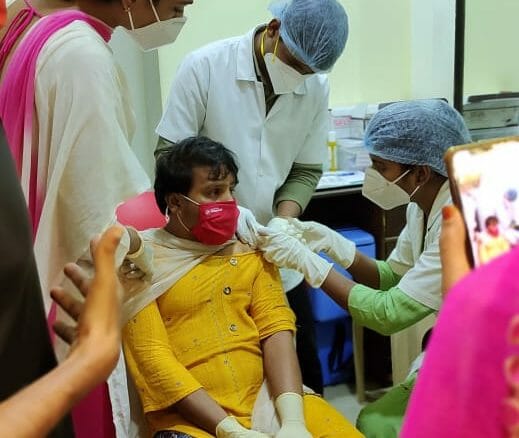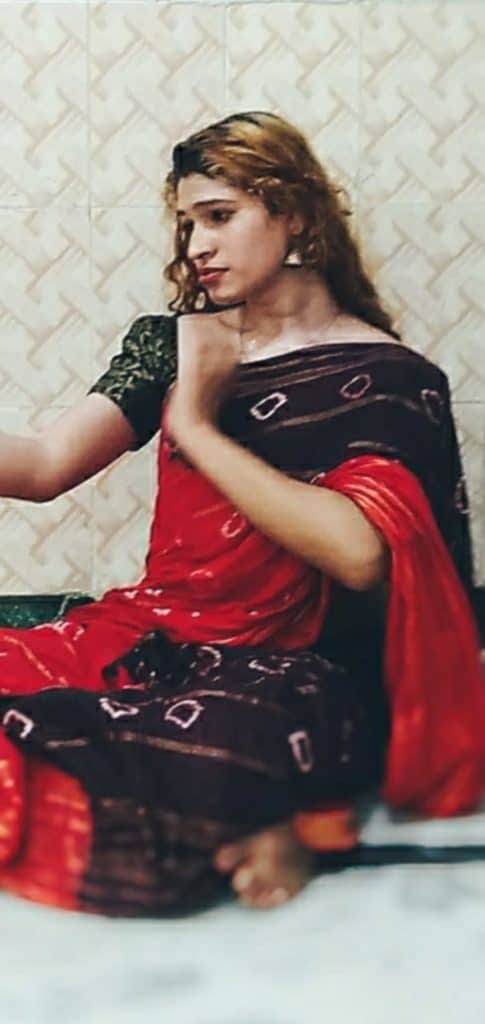As one walks into the infinitesimal lanes in Daulat Nagar, Borivali, the houses, one over the other, start to narrate the story of their occupants.
The slum is primarily home to the transgender community in the locality. Renting a 30meter square house costs anywhere between Rs 5000- Rs 6000 per month. This is one of the biggest expenses for the transgender community, who mainly earn by begging.
A 32-year-old transwoman lives in the slum of Daulat Nagar. Since the lockdown, she and other community members are not earning much as they can’t go begging in trains or in streets or to shopkeepers, which was their main source of livelihood. All form of other activiies like sex work is also at halt.
“During the first lockdown when we couldn’t go begging, some good humanitarian gave us ration. But, that’s not enough. Where do we stay? We can’t afford the rent anymore. We are in huge debt as rent loan keeps piling on with no source of livelihood,” she said.
In the 2020 lockdown, the Transgender Welfare Equity and Empowerment Trust (TWEET) Foundation started a fundraiser to help the community. “Within a few months, we were getting many distress calls; whether it was about rent or landlords bullying them or harassment and others. Many trans people were and are still unable to afford their medicines related to HIV and gender change horomones,” said Shaman Gupta, co-chair of the Foundation.
In the second lockdown, he added, they relaunched the fundraiser but it wasn’t as successful as the earlier one. “In the first lockdown, there was more coverage on the issue, it was picked up by media outlets and there was more support from citizens and government,” he said.
Read more: Mental health helpline received 72,000 calls in a year, thanks to the pandemic
In Mumbai, around 50,000 people belong to the community. While many of the struggling keep it going, some couldn’t bear the brunt of the lockdown. On May 12, 2020, a transwoman who was HIV positive died by suicide in Malad in suburbs. Though there wasn’t a suicide note, it is believed that her death was due to struggle induced by unable to make ends meet, no healthcare and lost source of livelihood during lockdown.
Sonali Chaukedar, a 35-year-old trans woman from Bombay, said that the community was not serious about the virus initially. “But as it spread, we got scared for our life and financial security. We couldn’t go to homes when a new child is born to give blessings, nor beg in trains or streets. We couldn’t even perform dances. Everything was shut. The non- profit organisation Kinnar Maa Trust gave us some dry ration along with sanitiser due to which we survived,” she said.
In 2021, with the second lockdown some restrictions were eased. However, Sonali says it is for elites and not for them. “Easing of restrictions has not helped us as we are still not allowed on local trains,” she said.
Most transgender people don’t have identity cards and are not eligible for welfare schemes and vaccinations.
“We are discriminated against, we are bullied. We need a place to stay. If we are ill, at least we can be isolated. Where do we go if we are ill?,” said Salma Khan, founder of Kinnarma Trust and the first transgender woman to be a member of Lok Adalat at the Mumbai District Suburban Legal Services Authority (DLSA).

What is the government doing?
When India first went into lockdown in 2020, after receiving distress calls and emails, the central government decided that each transgender person would receive Rs 1,500 in direct transfer and additional ration supplies. However, out of the 4.8 million population of transgender, only about 5000 received the benefit.
Maharashtra government is contemplating providing a one-time financial assistance of Rs 1,500 to transgender people in the state. Ravindra Kadam-Patil, the deputy commissioner of social justice, told the Times of India that they have asked all divisional deputy commissioners to give data on the number of transgenders living in their respective jurisdiction and how to provide the benefits to them.
However, no concrete action is visible. “In the first lockdown, I received Rs 1500 from the central government. But, this time money hasn’t come. Only very few transgenders have received the money. Many don’t have bank accounts and a valid identity proof,” said Salma.
“Our life has always been away from rights and equality and the pandemic has further worsened it. To help the trans people and other marginalised people like those who are homeless, victims of rape etc, we have distributed ration. We have taken the help of many organisations and ensured the bare minimum is provided to them. However, why should we do this? It’s the government’s responsibility and not ours. They should take a step forward,” Salma added.
Citizen Matters contacted the Maharashtra social justice department multiple times but did not get a response.
Last year in October, to tackle the lack of identity proof issue in the transgender community, the National Council for Transgender Persons (NCTP) constituted by Centre, decided to make ‘special idenity’ cards for transgenders. The cards will help them link with other social welfare schemes. However, the transgenders whom Citizen Matters spoke to are unaware of any such decision.
Lack of ID cards
Only four percent of India’s population is fully vaccinated. The shortage of vaccines hits the trans community hard, even though they are at a greater risk of infection, according to National Centre for Transgender Equality (NCTE), a US-based non-profit.
“Trans adults are also more likely to rate their health as poor or fair in comparison to others. More than 1 out of 5 transgender adults have at least one or more chronic condition, such as diabetes, arthritis or asthma,” read the NCTE report.
It added that more than half the community consumed tobacco, which only made them more vulnerable to the disease since COVID-19 affects the respiratory system.
For vaccination, one must register at COWIN, book a slot and then take the jab. One has to present their Aadhar card to register for vaccination. But many in the transgender community lack valid identity proof or fall on the dark side of the digital divide. In addition to that, many are reluctant to go to hospitals for fear of being bullied. “We don’t know which ward to go to, whether male or female. Even doctors make fun of us,” said a trans person from Malad.

Vaccination for trans people
The recent data released by the health ministry in May 2021 stated that just 20,269 trans people were vaccinated out of their total population of 4.87 lakh in India.
On 20 June 20 over 70 transpeople received their first jab in a vaccination drive organised by SL Raheja Hospital in Mahim.
“Many trans members are immunocompromised and are at a greater risk of infection from the virus. We are extremely happy that a hospital has initiated such a drive, and have helped trans members get vaccinated in a hassle free manner,” Laxmi Narayan Tripathi a transgender activist, told News 18.
In Bengaluru, Manipal Hospital launched a vaccination drive for transpeople in June. The Russian vaccine, Sputnik V, was provided to the transgender community free of cost during the Pride Month.
In Kolkata, an NGO ‘Together We Can Foundation’, with help from a businessman organised a vaccination drive for transpeople in June. Almost 100 of them got the first dose at Apollo hospital. Kajol Mondol, a transperson from Kolkata, who got vaccinated told India today at they fear going to government hospitals as they might be bullied and socially alienated.
Assam has started vaccination programmes for the community by coordinating with associations working with trans persons.